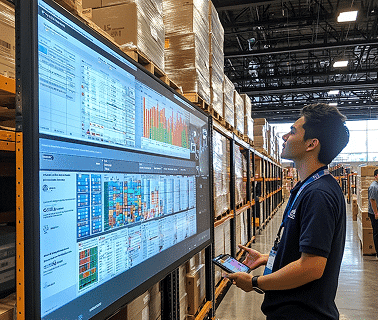Listen to this blog
Key takeaways:
- The biggest trends in supply chain management that are related to its automation with AI and blockchain.
- Supply Chain Management tries to eases the entire journey of products and goods – from production to delivery.
What is Supply Chain Management aka ‘SCM’?
The supply chain management (SCM) is used to manage the entire supply chain of a business. It is used to track and monitor a product’s entire lifecycle from its manufacture to its delivery.
The SCM software tracks the movement of products throughout the supply chain and enables a company to monitor the quality, quantity and time taken to deliver each product from one point to another in the supply chain. It also helps manage orders, inventory, suppliers, distribution centres and customers.
There are many types of SCM software available in the market today, but some are better than others when it comes to providing solutions for specific industries such as manufacturing or retail etc. The most common type of SCM software you will find today is enterprise resource planning (ERP). This type of system has been designed specifically for large organisations with multiple departments involved with different aspects of running an organisation like sales, accounting etc.
The technology in supply chain management is a series of links between the suppliers, manufacturers and customers. It includes all the processes involved in moving products from one place to another and requires warehousing and distribution of goods.
The main focus of SCM is on maximising customer satisfaction by improving quality, reducing costs and improving service levels. This can be achieved through better collaboration between all departments within a company and between different companies involved in the process.
Some benefits of good supply chain management include:
- Improved customer satisfaction through increased availability of products at competitive prices
- Reduced inventory levels due to better forecasting techniques which leads to lower carrying costs
- Reduced downtime due to better maintenance planning which results in fewer unexpected breakdowns leading to lost revenue
10 future and current trends in supply chain management

| Trends | Description |
|---|---|
| Last-mile delivery solutions | Last-mile delivery solutions are one way SCM is helping businesses solve problems they didn’t even know they had—and they are making it easier than ever to get your product where it needs to go. |
| Industry 4.0 and SCM | Tracking goods from their source through production, delivery, and end-use provides manufacturers with invaluable insights into their supply chains. |
| The rise of e-commerce | With the advent of e-commerce, companies have started selling their products online, which has helped them reach out to a larger audience than ever before. |
| Advanced analytics and automation for inventory and delivery | Supply Chain Management (SCM) has generated advanced analytics and automation for inventory and delivery with its technological impacts. |
| Digital supply chains | SCM has enabled companies to manage their supply chains digitally through applications such as ERP, MES, WMS and MRP. |
| Cybersecurity | SCM systems are often targets for hackers who want to steal that information and sell it on the black market or use it for their own purposes. |
| Net-zero Supply Chains | SCM has generated net-zero supply chains by leveraging technology to make communication between all members of an organisation more efficient. |
Raising ESG standards | With the effects of climate change and other environmental concerns, companies need to be able to understand their supply chains and know how they can improve the ecology. |
| Localising the supply chain | SCM has allowed companies to become more flexible in their production and distribution processes. |
| Using crowdsourced delivery and multiple logistics partners | It is not just that companies are using crowdsourced delivery, which is certainly a big part of it. They are also using multiple specialised logistics partners to deliver products. And this has led to some pretty amazing technological impacts on the industry. |
Supply chain management, or SCM, is an extensive field. It is not just about handling supply chains for different companies—it includes everything from inventory management to customer service to logistics. It is also one of the fastest-growing fields in business, with a projected growth rate of 8.6% through 2022.
SCM has changed a lot over the years. For example, in the 1990s and early 2000s, companies were focused on getting their technology in supply chain management set up so they could get products out quickly and efficiently. But now, we are seeing a shift toward ensuring that the entire process is as environmentally friendly as possible. This means using sustainable materials, reducing waste during production, and ensuring that all products are safe for consumers.
New technologies like blockchain can help companies get data from multiple sources in real-time and track down problems before they happen; artificial intelligence can help companies make better decisions about how best to manage their technology in supply chain management, and big data analytics can help them understand how their customers interact with products at every stage of their lives (from buying them to using them).
- Industry 4.0 and SCM
You’ll first notice that there are more ways than ever before for companies to get their products to market. This means more competition and more opportunities for your business. It also means that you need to ensure that your business is set up so that it can take advantage of these opportunities when they come along.
The impact of SCM on the industry has been nothing short of revolutionary. The technological advancement in the field has made it possible for manufacturers to work more efficiently, which has led to lower costs and greater profits for companies across all industries.
In addition, tracking goods from their source through production, delivery, and end-use provides manufacturers with invaluable insights into their supply chains. They can use this information to make better decisions about where they buy materials and how they ship goods—which can lead to more efficient processes and more satisfied customers.
- The rise of e-commerce
With the advent of e-commerce, companies have started selling their products online, which has helped them reach out to a larger audience than ever before. This trend has also increased competition among companies trying to win over customers’ hearts by providing them with better services and products at affordable prices. E-commerce has made shopping more accessible and convenient for buyers by providing them with different payment options, such as credit cards, debit cards, etc., along with easy returns policies that ensure customers are satisfied with their purchases.
With the help of technology, companies have been able to track their sales performance on an hourly basis which helps them understand what their customers want from them and how they can improve their business strategy accordingly to cater for those needs.
- Advanced analytics and automation for inventory and delivery
Supply Chain Management (SCM) has generated Advanced analytics and automation for inventory and delivery with its technological impacts. The SCM technology has been a boon for the supply chain industry because it efficiently manages the entire supply chain process. The technology used in SCM mainly focuses on improving the entire process’s efficiency, including inventory management, procurement management, transportation management, order management and customer service management.
The warehouse management systems have been an important part of any supply chain programme since they help companies manage their inventories efficiently by identifying their needs and keeping track of their current inventory levels and customer orders. The warehouse management system also helps companies keep track of items received from suppliers or vendors so they can be sent to customers according to their order requirements.
The advanced software used in these systems also allows companies to reduce manual processes by automating certain tasks like ordering supplies or ordering products from vendors.
- Digital supply chains
Supply Chain Management (SCM) is the core of any company’s success. The role of SCM is to ensure that the right products are delivered to the right place at the right time, at a minimum cost.
The supply chain management system has been undergoing many transformations since its inception. It has enabled companies to manage their supply chains digitally through applications such as ERP, MES, WMS and MRP. This makes it easy for them to track every aspect of their business process, from order placement to delivery.
The digital SCM systems also reduce costs by automating manual processes and speeding up delivery times by using robotics or artificial intelligence (AI).
Another advantage of digital SCM systems is that they can be accessed anywhere, anytime from any device, including smartphones or tablets. This means that employees can access information about orders or products anytime from anywhere without travelling long distances between locations, which saves time and money for both employees and employers.
Want to master the concept of SCM with the latest knowledge, have a quick look at Online Manipal courses.
- Cybersecurity
On the surface, it might seem like the future of supply chain management (SCM) is only about things like inventory and logistics. However, the truth is that SCM has generated a whole new area of cybersecurity with its technological impacts.
It involves collecting and storing sensitive data such as credit card numbers, employee information, and other information about customers or partners. Because of this, SCM systems are often targets for hackers who want to steal that information and sell it on the black market or use it for their own purposes.
- Net-zero Supply Chains
The supply chain management industry has rapidly evolved over the past five years, and it is not hard to see why. Supply chains are complex and ever-shifting, and as businesses try to keep up with the demand for faster turnaround times and more customised products, that complexity will only grow.
SCM has generated net-zero supply chains by leveraging technology to make communication between all members of an organisation more efficient, because of which, you can save time and money while still getting your products out on time.
- Raising ESG standards
Supply Chain Management (SCM) has been a focus for many companies in recent years. With the effects of climate change and other environmental concerns, companies need to be able to understand their supply chains and know how they can improve them.
It also looks at how these processes impact society as a whole, including things like workers’ rights issues and environmental concerns such as pollution levels around the world where different kinds of manufacturing processes take place, such as factories located overseas where labour costs are cheaper.
- Localising the supply chain
SCM has allowed companies to become more flexible in their production and distribution processes. In the past, companies were limited by the number of suppliers they could use and the distance those suppliers could be from their factories. Now, with just-in-time manufacturing techniques, companies can produce products locally using local materials and local labour. This has led to increased competition between companies for local suppliers and increased competition between countries for multinational businesses.
However, it also means that there are fewer jobs available for humans in these areas, which can cause unemployment problems within communities that rely heavily on those jobs (eg., truck drivers). SCM has led to an increase in global trade, which gives consumers access to a wider variety of products at lower costs than ever before! But this can also lead to less diversity within communities as people tend not to buy local goods when they can get something better.
- Using crowdsourced delivery and multiple logistics partners
One of the most interesting things about SCM is how it has generated an entirely new approach to logistics and supply chain management.
It is not just that companies are using crowdsourced delivery, which is certainly a big part of it. They are also using multiple specialised logistics partners to deliver products. And this has led to some amazing technological impacts on the industry.
For example, many companies are now trying to use drones to deliver their products to customers. This has created a whole new industry around it, with drones, manufacturers and pilots being hired. It has also led to an increase in demand for apps that help companies track their deliveries to ensure everything goes smoothly from start to finish.
Another important development is related to software—specifically, software designed for managing logistics operations at scale. These software systems have enabled companies to manage all aspects of their role of information technology in supply chain management from one place instead of having separate software for each part of the process. This makes it easier for them to keep track of everything going on within their organisation, so they know what needs improvement or updating next time!
- Last-mile delivery solutions
Supply chain management (SCM) has been a buzzword for over a decade. The technology helps businesses keep track of their supply chains from manufacturing to product delivery, and ensure that every part of their business is working as it should be. But what does this mean for you?
Last-mile delivery solutions are one way SCM is helping businesses solve problems they didn’t even know they had—and they are making it easier than ever to get your product. This is especially important if you’re a small business owner or entrepreneur specialising in providing products and services that need to be delivered directly to the customer’s doorstep. In fact, many companies have found that this type of delivery is more cost-effective than shipping via traditional means such as trucking companies or freight trains.
It is easy to see why—why pay someone else when you can do it yourself? And with SCM technology at your disposal, getting your product delivered means tapping into a wealth of information about how best to accomplish this task without breaking the bank or risking damage during transit.
Conclusion
The automation era is coming in supply chain management. It will be easy for SCM organisations to decide which system to automate. Today the capabilities of the systems are so wide and complex that the decision process may take weeks or even months. In the end, most expect that in 2022 organisations will have a few different automated processes running.
The biggest challenge will be to integrate these systems properly and run them in a very well-planned manner. This is still not easy since all systems have been designed and developed separately. As a result, all processes are running further independently from the other systems today. And integration would take extra time and effort if the new system is going to be the next upgrade.
Want to know more? Enrol in Postgraduate Certificate Programme in Logistics & Supply Chain Management at Online Manipal for a better understanding and boost your career.
Prepare for your next career milestone with us







